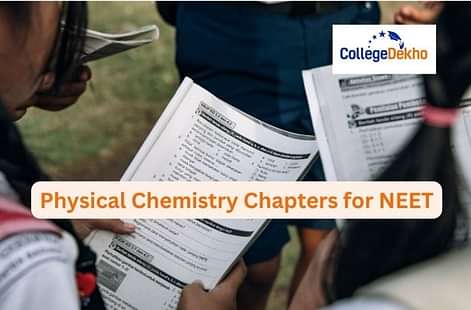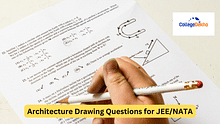
NEET 2024 Physical Chemistry Chapters are a significant part of the NEET UG 2024 Exam. To get a good score in NEET UG aspirants are required to have a strong grip on Chemistry along with Physics and Biology. Medical aspirants must note that recently a few changes have been made to the NEET Syllabus 2024, with some chapters removed and others added or modified. Now, the Chemistry syllabus is divided into Physical Chemistry, Organic Chemistry, and Inorganic Chemistry sections, instead of merely being split into Class 11th and Class 12th topics.
NEET UG is a highly competitive undergraduate-level medical entrance exam in India. As per the new NEET pattern for 2024, there will be 50 Chemistry questions (35 in Section A and 15 in Section B), and candidates must answer 45 (10 out of 15 in Section B). NEET 2024 is scheduled for May 5, 2024. This article provides insight into the important Physical Chemistry Chapters for NEET 2024.
Physical Chemistry Chapters for NEET: Unit-wise Topics
The Physical Chemistry Chapters for NEET 2024 covers eight units. Below is the detailed syllabus for this section.
Unit I
Some Basic Concepts of Chemistry | ||
|---|---|---|
Matter and its Nature | Dalton's Atomic Theory: Concept of Atom, Molecule, Element, and Compound | Laws of Chemical Combination |
Atomic and Molecular Masses | Mole Concept | Molar Mass |
Percentage Composition | Empirical and Molecular Formulae: Chemical Equations and Stoichiometry | -- |
Unit II
Atomic Structure | ||
|---|---|---|
Nature of Electromagnetic Radiation, Photoelectric Effect | Spectrum of the Hydrogen Atom | Bohr Model of a Hydrogen Atom - its Postulates, Derivation of the Relations for the Energy of the Electron and Radii of the Different Orbits |
Limitations of Bohr's Model | Dual Nature of Matter | De Broglie's Relationship |
Heisenberg Uncertainty Principle | Elementary Ideas of Quantum Mechanics | Quantum Mechanics |
The Quantum Mechanical Model of the Atom | Concept of Atomic Orbitals as One-electron Wave Functions: Variation of Ψ and Ψ2 with r for 1s and 2s Orbitals | Shapes of s, p, and d - Orbitals |
Electron Spin and Spin Quantum Number | Rules for Filling Electrons in Orbits - Aufbau Principle | Pauli's Exclusion Principle and Hund's Rule |
Electronic Configuration of Elements, and Extra Stability of Half-filled and Filled Orbitals | -- | -- |
Unit III
Chemical Bonding and Molecular Structure | ||
|---|---|---|
Kossel-Lewis Approach to Chemical Bond Formation | Ionic Bonding | Covalent Bonding |
Quantum Mechanical Approach to Covalent Bonding | Molecular Orbital Theory | Elementary Idea of Metallic Bonding |
Concept of Ionic and Covalent Bonds | Valence Bond Theory | Hydrogen Bonding and its Applications |
Unit IV
Chemical Thermodynamics | ||
|---|---|---|
Fundamentals of Thermodynamics | The First Law of Thermodynamics | The Second Law of Thermodynamics |
Unit V
Solutions | ||
|---|---|---|
Different Methods for Expressing the Concentration of Solution | Percentage (by volume and mass both) | Vapour Pressure of Solutions and Raoult's Law |
Vapour Pressure - Composition | Plots for Ideal and Non-Ideal Solutions | Depression of Freezing Point |
The Elevation of Boiling Point and Osmotic Pressure | Determination of Molecular Mass Using Colligative Properties | Van't Hoff Factor and its Significance. |
Unit VI
Equilibrium | ||
|---|---|---|
Meaning of Equilibrium, the Concept of Dynamic Equilibrium | Equilibrium Involving Chemical Processes | Equilibria Involving Physical Processes |
Common Ion Effect | Hydrolysis of Salts and PH of their Solutions | Ionic Equilibrium: Weak and Strong electrolytes |
Ionization of Electrolytes | PH Scale | -- |
Unit VII
Redox Reactions and Electrochemistry | ||
|---|---|---|
Electrochemical Cells - Electrolytic and Galvanic Cells | Different Types of Electrodes | Electrode Potentials including Standard Electrode Potential |
Half-cell and Cell Reactions | EMF of a Galvanic Cell and its Measurement | Relationship between Cell Potential and Gibbs' Energy Change |
Electronic concepts of Oxidation-Reduction | Redox Reactions, Oxidation Numbers, Rules for Assigning Oxidation Numbers, Balancing of Redox Reactions | Electrolytic and Metallic Conduction |
Conductance in Electrolytic Solutions | Molar Conductivities and their Variation with Concentration | Kohlrausch's Law and its Applications |
Unit VIII
Chemical Kinetics | ||
|---|---|---|
Rate of a Chemical Reaction | Elementary and Complex Reactions | Rate Law, Rate Constants and its Units |
Differential and Integral Forms of Zero and First-order Reactions | Effect of Temperature on the Rate of Reactions | Arrhenius Theory |
Activation Energy and its Calculation | Collision Theory of Bimolecular Gaseous Reactions (no derivation) | -- |
Check out the complete NEET Chemistry Syllabus 2024 here! | ||
Also Read: NEET 2024 Organic Chemistry Chapters
Removed Physical Chemistry Chapters from NEET Syllabus 2024
NEET Chapters for Physical Chemistry no longer include the following units or chapters:
Units | Chapters |
|---|---|
Some Basic Concepts of Chemistry | Concept of shells and subshells - Atomic number, isotopes, and isobars - Dual nature of matter and light - General Introduction: Importance and scope of chemistry - Structure of Atom |
Environmental Chemistry | Pollution due to industrial wastes - Greenhouse effect and global warming - Acid rain, ozone, and its reactions - Effects of depletion of ozone layer - Chemical reactions in the atmosphere - Strategy for the control of environmental pollution - Environmental pollution: Air, water, and soil pollution - Smogs and major atmospheric pollutants - Green chemistry as an alternative tool for reducing pollution |
Chemistry in Everyday Life | Chemicals in food: Preservatives, artificial sweetening agents, elementary idea of antioxidants - Cleansing agents: Soaps and detergents, cleansing action - Chemicals in medicines: Analgesics, tranquillizers, antiseptics, disinfectants, antimicrobials, antifertility drugs, antibiotics, antacids, antihistamines |
Surface Chemistry | Tyndall effect, Brownian movement, electrophoresis, coagulation - Adsorption: Physisorption and chemisorption; factors affecting adsorption of gases on solids - Colloidal state: Distinction between true solutions, colloids, and suspensions; lyophilic, lyophobic, multimolecular, and macromolecular colloids; properties of colloids - Emulsions: Types of emulsions - Catalysis: Homogeneous and heterogeneous, activity, and selectivity; enzyme catalysis |
Got questions? Take a look at the FAQs Regarding NEET 2024 Syllabus by NTA
Physical Chemistry Chapters for NEET: Class-wise Weightage
As NEET covers material from both Class 11th and Class 12th, the table below outlines the weightage of NEET Physical Chemistry syllabus from each class and section.
Section | NEET Physical Chemistry Questions from Class 11 | NEET Physical Chemistry Questions from Class 12 |
|---|---|---|
Section A | 5% | 6% |
Section B | 2% | 3% |
Don't forget to check the NEET 2024 Information Bulletin published by NTA on February 9!
Physical Chemistry for NEET - Chapter-wise Weightage
This table captures the topics from the Physical Chemistry Chapters for NEET from Class 11th and their approximate percentage weightage.
Physical Chemistry Chapters in NEET from Class 11 | Weightage in NEET |
|---|---|
Mole Concept | 5% |
Atomic Structure and Nuclear Chemistry | 3% |
Gaseous State | 3% |
Thermodynamics & Thermochemistry | 3% |
Chemical Equilibrium | 3% |
Ionic Equilibrium | 4% |
Redox Reactions | 2% |
Check out the topics from the Physical Chemistry Chapters for NEET from Class 12th and their approximate percentage weightage.
Physical Chemistry Chapters in NEET from Class 12 | Weightage in NEET |
|---|---|
Solid State | 3% |
Solutions & Colligative Properties | 4% |
Electrochemistry | 3% |
Chemical Kinetics | 4% |
Surface Chemistry | 2% |
Also Read: NEET 2024 Inorganic Chemistry Chapters
Physical Chemistry Chapters in NEET - Difficulty Level
Based on last year’s NEET analysis, the difficulty level of questions in Section A ranged from easy to moderate, while Section B questions were relatively easy. The tables below outline the difficulty levels for Physical Chemistry Chapters in NEET from both Class 11 and Class 12 syllabi for each section.
Section A
Section A featured questions of easy to moderate difficulty level with an even distribution are listed below.
Topics | Easy | Medium | Difficult | Total |
|---|---|---|---|---|
Physical Chemistry Class 11 | 0 | 3 | 1 | 4 |
Physical Chemistry Class 12 | 3 | 3 | 2 | 7 |
Section B
Section B featured questions of easy to moderate difficulty level with an even distribution are given below:
Topics | Easy | Medium | Difficult | Total |
|---|---|---|---|---|
Physical Chemistry Class 11 | 0 | 3 | 0 | 3 |
Physical Chemistry Class 12 | 1 | 1 | 1 | 3 |
Aspiring NEET 2024 candidates should focus on the above-mentioned NEET Physical Chemistry Chapters to excel in the exam. With ample time remaining, it is crucial to identify strengths and weaknesses and prioritize preparation based on weightage!


















Similar Articles
7 Tips to Strengthen FMGE 2024 Preparation
FMGE 2024 Application Form Correction: Dates, Direct Link, Process, Details to Edit
What to Do if You Don't Qualify FMGE 2024?
What is a Good Score in FMGE 2024?
FMGE 2024 Qualifying Marks
List of Medical Colleges for 500-600 Marks in NEET UG 2024